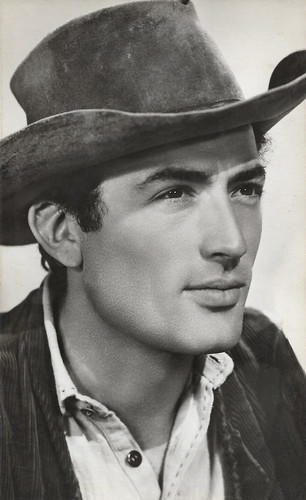
Spanish postcard by Archivo Bermejo, Barcelona, no. 4046. Photo: M.G.M. Gregory Peck in The Yearling (Clarence Brown, 1946).

Spanish postcard, 1953. Photo: Procines S.A. Gregory Peck and Jennifer Jones in Duel in the Sun (King Vidor, 1946).

Italian postcard, no. 1216. Photo: United Artists. Gregory Peck and Ingrid Bergman in Spellbound (Alfred Hitchcock, 1945).
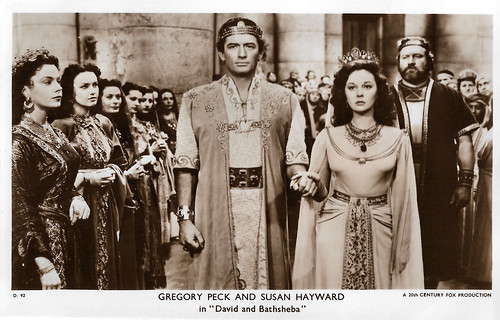
British postcard by The Picturegoer Series, London, no. D 92. Photo: 20th Century Fox. Gregory Peck and Susan Hayward in David and Bathsheba (Henry King, 1951).

German postcard by Kunst und Bild, Berlin, no. A 1079. Photo: Paramount. Audrey Hepburn and Gregory Peck in Roman Holiday (William Wyler, 1952).
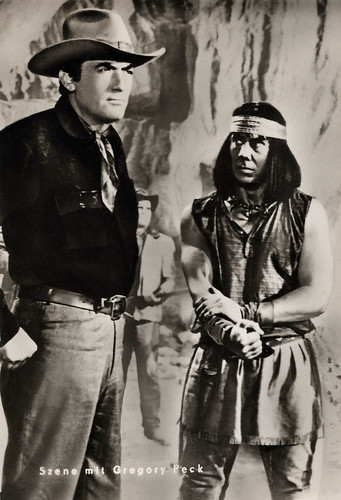
East-German postcard by VEB Progress Film-Vertrieb, Berlin, no. 229/70. Gregory Peck in Mackenna's Gold (J. Lee Thompson, 1969).
Tall, rugged, and heroic, with a basic decency
Eldred Gregory Peck was born in 1916 in La Jolla, California (now in San Diego). His parents were Bernice Mary (Ayres) and Gregory Pearl Peck, a chemist, and druggist in San Diego. His parents divorced when he was five years old. An only child, he was sent to live with his grandmother.
He never felt he had a stable childhood. His fondest memories are of his grandmother taking him to the cinema every week and of his dog, which followed him everywhere. Peck's father encouraged him to take up medicine. He studied pre-med at UC-Berkeley and, while there, got bitten by the acting bug and decided to change the focus of his studies.
He enrolled in the Neighborhood Playhouse in New York and debuted on Broadway after graduation. His debut was in Emlyn Williams' play 'The Morning Star' (1942). By 1943, he was in Hollywood, where he debuted in the RKO film Days of Glory (Jacques Tourneur, 1944).
Stardom came with his next film, The Keys of the Kingdom (John M. Stahl, 1944), for which he was nominated for an Oscar. Tony Fontana at IMDb: "Peck's screen presence displayed the qualities for which he became well known. He was tall, rugged and heroic, with a basic decency that transcended his roles."
He appeared opposite Ingrid Bergman in Alfred Hitchcock's Spellbound (1945) as an amnesia victim accused of murder. In The Yearling (Clarence Brown, 1946), he was again nominated for an Oscar and won the Golden Globe. He was especially effective in Westerns and appeared in such varied fare as David O. Selznick's critically blasted Duel in the Sun (King Vidor, 1946), the somewhat better received Yellow Sky (William A. Wellman, 1948), and the acclaimed The Gunfighter (Henry King, 1950).
He was nominated again for the Academy Award for his roles in Gentleman's Agreement (Elia Kazan, 1947), which dealt with anti-Semitism, and Twelve O'Clock High (Henry King, 1949), a story of high-level stress in an Air Force bomber unit in World War II. In 1947, Peck, along with Dorothy McGuire, David O'Selznick, and Mel Ferrer, founded the La Jolla Playhouse, located in his hometown, and produced many of the classics there. Due to film commitments, he could not return to Broadway but whet his appetite for live theatre on occasion at the Playhouse, keeping it firmly established with a strong, reputable name over the years.
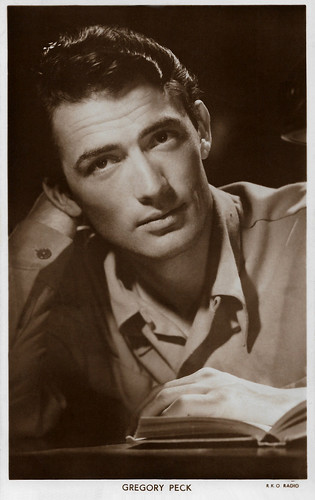
British postcard in the Picturegoer Series, London, no. W. 187. Photo: R.K.O. Radio.
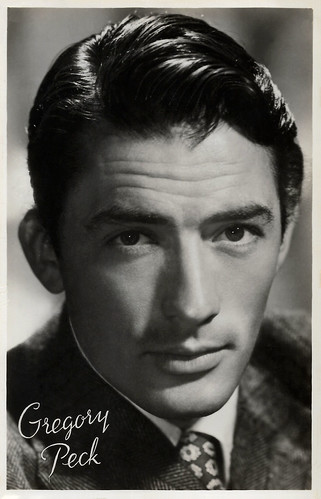
Dutch postcard. Photo: M.G.M. This card is a gift from Loek Coenraad from his mother's legacy. Many thanks, Loek!
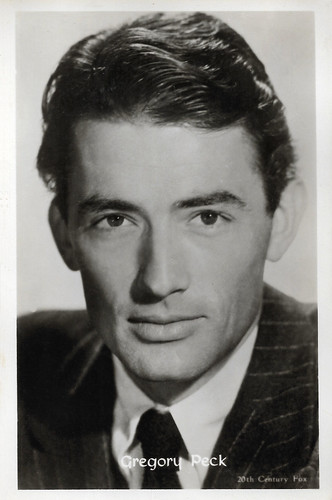
Vintage card. Photo: 20th Century Fox.
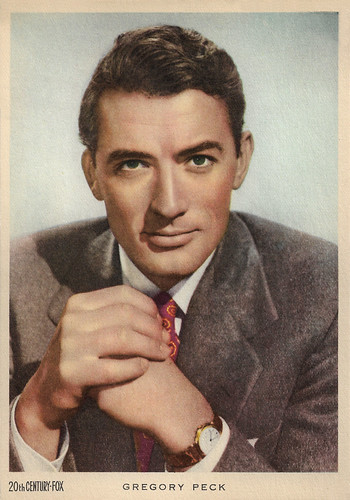
Uruguayan postcard by CF. Photo: 20th Century Fox.
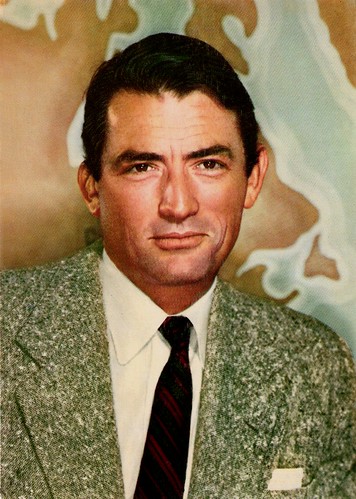
South-African postcard by East-West Publishers, Cape Town, no. 19.
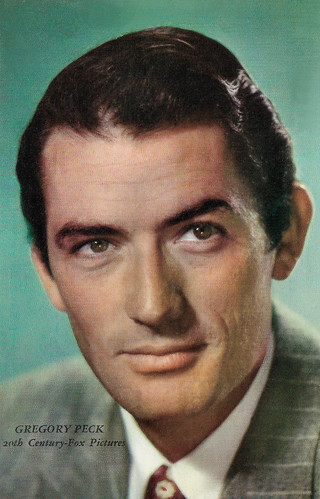
American card by Movie Candid Color Card, Beverly Hills, Calif., no. A32. Photo: Frank Powolny / 20th Century Fox. Caption: Gregory Peck began his professional career in 1939 as a barker. After a few appearances on Broadway, screenwriter Casey Robinson brought him to Hollywood where he rapidly became one of the screen's most sought-after stars.
The greatest film hero of the past 100 years
With a string of hits to his credit, Gregory Peck made the decision to only work in films that interested him. He continued to appear as the heroic, larger-than-life figures in such films as Captain Horatio Hornblower (Raoul Walsh, 1951) with Virginia Mayo, and Moby Dick (John Huston, 1956) with Richard Basehart.
He worked with Audrey Hepburn in her Hollywood debut film, Roman Holiday (William Wyler, 1953). While filming The Bravados (Henry King, 1958), he decided to become a cowboy in real life, so he purchased a vast working ranch near Santa Barbara, California - already stocked with 600 head of prize cattle.
In the early 1960s, he gave a powerful performance as Captain Keith Mallory in The Guns of Navarone (J. Lee Thompson, 1961) opposite David Niven and Anthony Quinn. The film was one of the biggest box-office hits of that year. Peck finally won the Oscar, after four nominations, for his performance as lawyer Atticus Finch in To Kill a Mockingbird (Robert Mulligan, 1962).
He also appeared in two darker films than he usually made, Cape Fear (J. Lee Thompson, 1962) opposite Robert Mitchum, and Captain Newman, M.D. (David Miller, 1963) with Tony Curtis, which dealt with the way people live. The financial failure of Cape Fear (1962) ended his company, Melville Productions.
After making Arabesque (Stanley Donen, 1966) with Sophia Loren, Peck withdrew from acting for three years in order to concentrate on various humanitarian causes, including the American Cancer Society. In the early 1970s, he produced two films, The Trial of the Catonsville Nine (Gordon Davidson, 1972) and The Dove (Charles Jarrott, 1974), when his film career stalled.
He made a comeback playing, somewhat woodenly, Ambassador Robert Thorn in the horror film The Omen (Richard Donner, 1976) with Lee Remick. After that, he returned to the bigger-than-life roles he was best known for, such as MacArthur (Joseph Sargent, 1977) and the infamous Nazi war criminal Dr. Josef Mengele in the huge hit The Boys from Brazil (Franklin J. Schaffner, 1978) with Laurence Olivier and James Mason.
In the 1980s, he moved into television with the miniseries The Blue and the Gray (Andrew V. McLaglen, 1982) in which he played Abraham Lincoln, and The Scarlet and the Black (Jerry London, 1983) with Christopher Plummer and John Gielgud. In 1991, he appeared in the remake of his 1962 film, playing a different role, in Martin Scorsese's Cape Fear (1991). He was also cast as the progressive-thinking owner of a wire and cable business in Other People's Money (Norman Jewison, 1991), starring Danny DeVito.
In 1967, Peck received the Academy's Jean Hersholt Humanitarian Award. He was also been awarded the US Presidential Medal of Freedom. Always politically progressive, he was active in such causes as anti-war protests, workers' rights, and civil rights. In 2003, Peck's portrayal of Atticus Finch was named the greatest film hero of the past 100 years by the American Film Institute, only two weeks before his death. Atticus beat out Indiana Jones, who was placed second, and James Bond who came third.
Gregory Peck died in 2003 in Los Angeles, California. He was 87. Peck was married twice. From 1942 till 1955, he was married to Greta Kukkonen. They had three children: Jonathan Peck (1944-1975), Stephen Peck (1946), and Carey Paul Peck (1949). His second wife was Veronique Passani, whom he met at the set of Roman Holliday. They married in 1955 and had two children: Tony Peck (1956) and Cecilia Peck (1958). The couple remained together till his death.
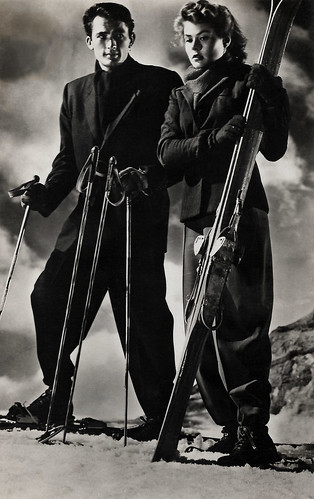
Spanish postcard by JDP, Valencia, no. 1092. Gregory Peck and Ingrid Bergman in Spellbound (Alfred Hitchcock, 1945).

Spanish postcard, no. 5292, 1953. Photo: Procines S.A. Gregory Peck, Jennifer Jones, and Joseph Cotten in Duel in the Sun (King Vidor, 1946).
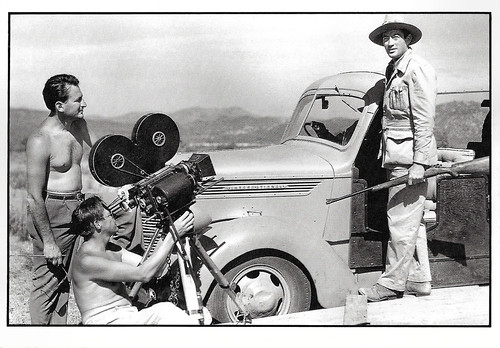
French postcard in the Entr'acte series by Éditions Asphodèle. Mâcon, no. 001/03. Gregory Peck and Karl Struss on the set of The Macomber Affair/Without Honor (Zoltan Korda, 1947). Caption: Low angle on Gregory Peck, on camera Karl Struss (middle).
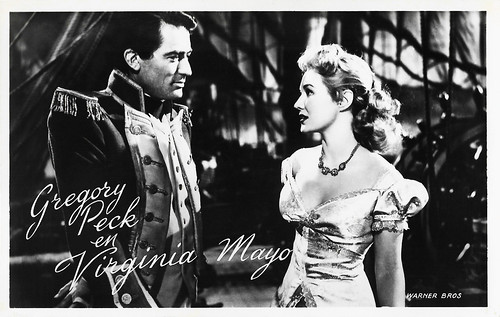
Dutch postcard by Takken, Utrecht, no. 610. Photo: Warner Bros. Gregory Peck and Virginia Mayo in Captain Horatio Hornblower (Raoul Walsh, 1951).
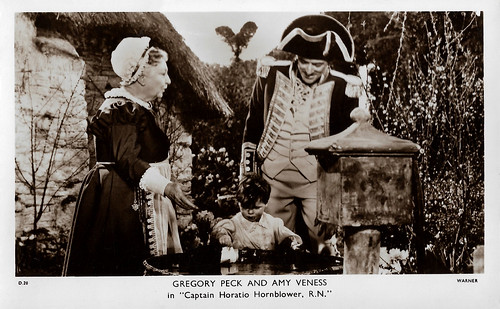
British postcard in the Picturegoer Series, no. D. 20. Photo: Warner Bros. Gregory Peck and Amy Veness in Captain Horatio Hornblower (Raoul Walsh, 1951).

British postcard by The Picturegoer Series, London, no. D 90. Photo: 20th Century Fox. Gregory Peck and Kieron Moore in David and Bathsheba (Henry King, 1951).
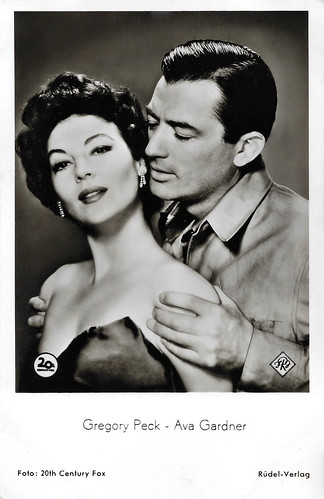
West-German postcard by Rüdel-Verlag, Hamburg-Bergedorf, no. 507. Photo: 20th Century Fox. Ava Gardner and Gregory Peck in The Snows of Kilimanjaro (Henry King, 1952).
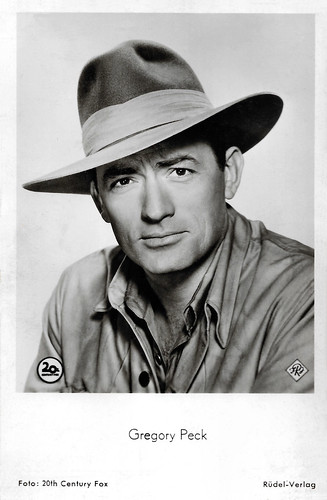
West-German postcard by Rüdel-Verlag, Hamburg-Bergedorf, no. 513. Photo: 20th Century Fox. Gregory Peck in The Snows of Kilimanjaro (Henry King, 1952).
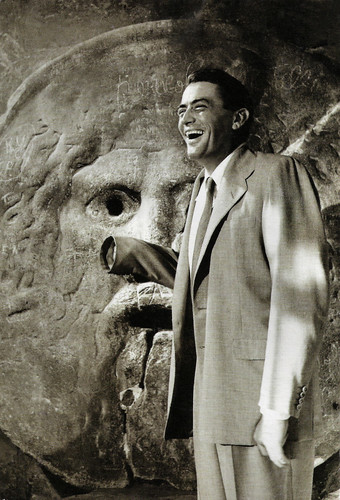
Italian postcard by W. Di Giovanni. Photo: Augusto Di Giovanni. Gregory Peck in Roman Holiday (William Wyler, 1953).
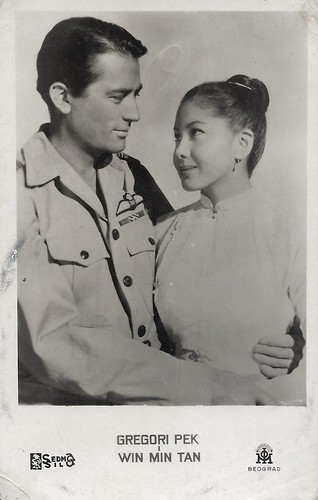
Yugoslavian postcard by Sedma Sila. Photo: Morava Film, Beograd (Belgrade). Gregory Peck and Win Min Tanh in the British film The Purple Plain (Robert Parrish, 1954).
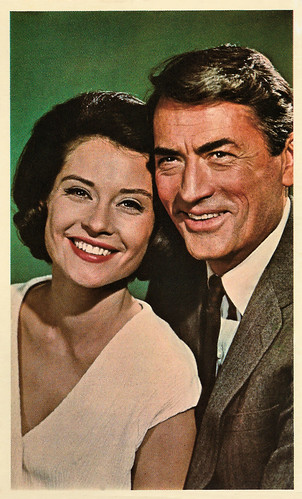
American collectors card by Universal Pictures Company, Inc., 1965. Photo: Universal. Gregory Peck and Diane Baker in Mirage (Edward Dmytryk, 1965).
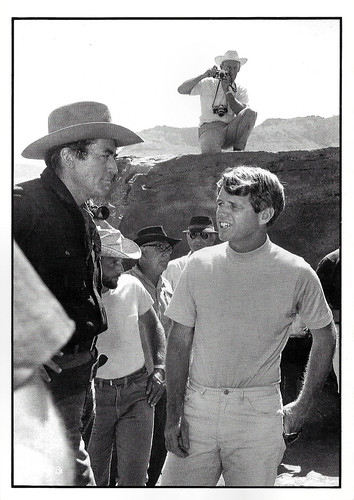
French postcard in the Entr'acte series by Éditions Asphodèle, Mâcon, no. 003/10. Collection: B. Courtel /D.R. Gregory Peck and Bob Kennedy on the set of Mackenna's Gold (J. Lee Thompson, 1969). Caption: Senator Bob Kennedy visits the film crew shooting in Arizona, starring Gregory Peck.
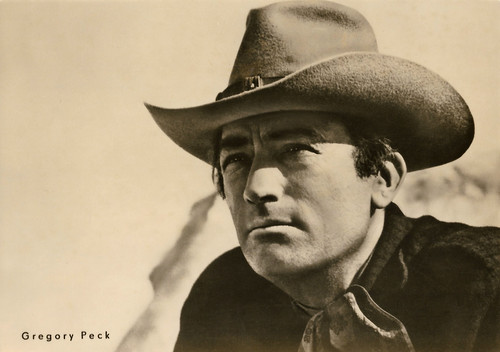
East-German postcard by VEB Progress Film-Vertrieb, Berlin, no. 184/70. Gregory Peck in Mackenna's Gold (J. Lee Thompson, 1969).
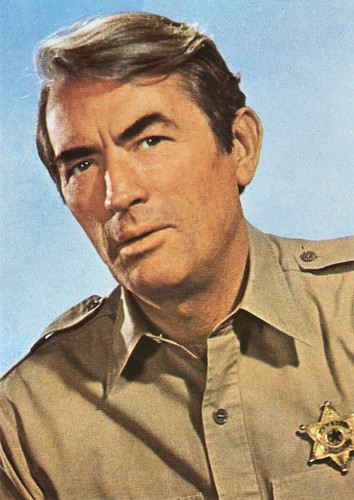
Romanian postcard by Casa Filmului Acin. Photo: 20th Century Fox. Gregory Peck in I Walk the Line (John Frankenheimer, 1970).
Sources: Tony Fontana (IMDb), and IMDb.
No comments:
Post a Comment